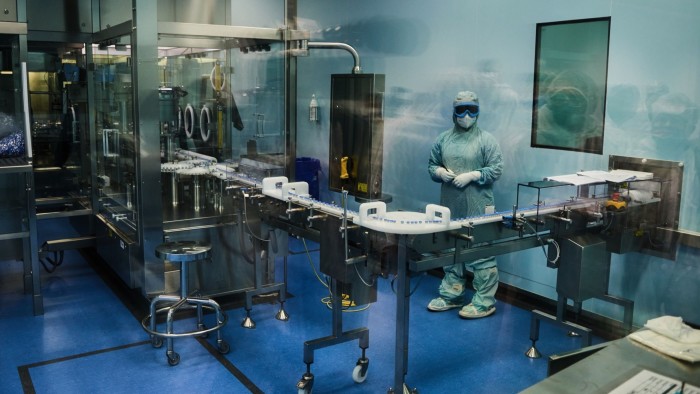Unlock the Editor’s Digest for free
Roula Khalaf, Editor of the FT, selects her favourite stories in this weekly newsletter.
Johnson & Johnson is working on a bid for $10bn neuroscience drugmaker Intra-Cellular Therapies, in what would be the biggest biotech deal in more than a year, according to people familiar with the matter.
The US pharmaceutical company is in talks over a possible takeover of Intra-Cellular, which is developing treatments for central nervous system disorders including major depressive disorder, generalised anxiety disorder and Parkinson’s disease, two people said.
The deal could be announced as soon as next week, as executives, dealmakers and investors gather in San Francisco for the annual JPMorgan healthcare conference, where biotech deals are typically unveiled, they added.
Any sale of Intra-Cellular, which had a market value of $10bn as of Friday, is likely to come with a premium, the people said, adding that talks could still fall apart or another buyer might emerge.
The deal would be a boon for the biotech sector, which struggled with a lack of mergers and acquisitions activity last year. In 2024, major pharma groups spent just $45bn across 30 deals, down from $84bn the year before.
Johnson & Johnson and Intra-Cellular did not respond to requests for comment. News of the deal was first reported on Sunday by Bloomberg.
A deal of that size would mark the biggest biotech acquisition since Pfizer’s $43bn takeover of Seagen in 2023. For Johnson & Johnson, which had a market value of $342bn as of Friday, it would be the company’s first big biotech deal since its $30bn buyout of rare disease drugmaker Actelion in 2017, its biggest acquisition to date.
Donald Trump’s return to the White House, and his appointment of what financiers view as less aggressive antitrust enforcers, have spurred hopes among dealmakers that 2025 could be a good year for M&A.
Like other drugmakers, Johnson & Johnson faces patent cliffs that it is looking to resolve. The company is projected to lose $17bn in revenues in 2029 when Darzalex, its blockbuster antibody treatment for rare blood cancers, comes off patent, according to data collected by investment bank Oppenheimer.
Johnson & Johnson has financial firepower, including cash and debt capacity, of about $120bn to pursue deals, according to analyst estimates. Recently, the company has focused on bolstering its medical technology division, last year spending $13.1bn for Shockwave Medical, which makes devices for patients with calcified arteries.
Intra-Cellular’s lead drug, Caplyta, has already been approved in the US to treat bipolar depression and generated $464mn in sales in 2023. The Food and Drug Administration is currently reviewing an approval application for Caplyta to treat major depressive disorder, which could expand the drug’s market.
Shares in Intra-Cellular jumped nearly 15 per cent on Friday after the company resolved a patent dispute with Sandoz, in which the generic drugmaker agreed not to launch a generic version of Caplyta until 2040.
Read the full article here

